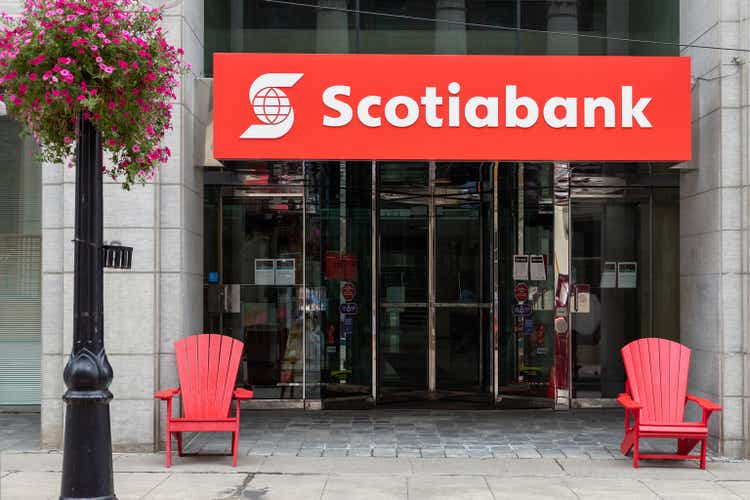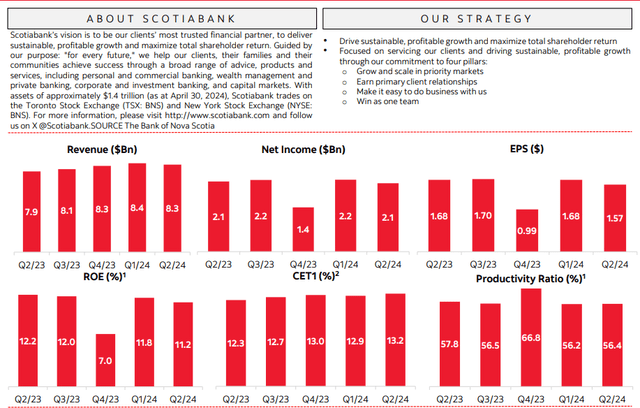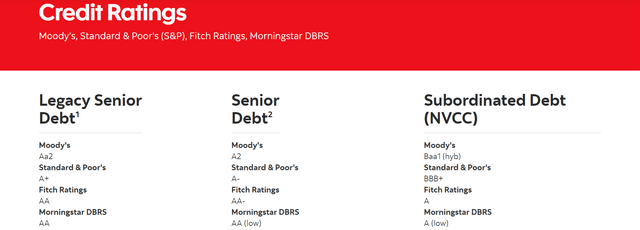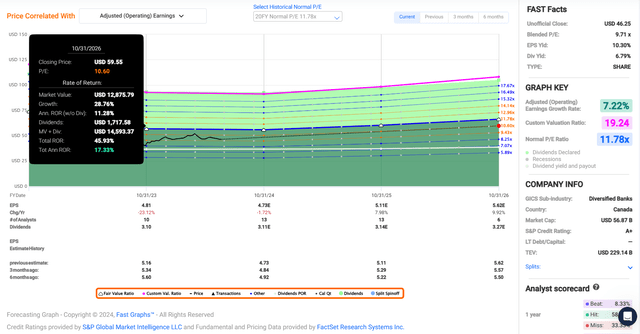Scotiabank: A 7%-Yielding Blue Chip Dividend Stock To Buy Now (NYSE:BNS)
Finance
A shot of the exterior of a Scotiabank location.
Iryna Tolmachova
As an individual, I have my moments of creativity. After all, I am self-employed as a dividend writer. That involves coming up with interesting and engaging headlines to support an investment thesis on a company or companies.
One of the things that I appreciate the most about dividend investing is that you don’t have to reinvent the wheel, though. For me, dividend investing often boils down to whether a company has a reputation for rewarding shareholders and the means to keep doing so. It can be that simple.
In a market where my artificial intelligence-related holdings can’t seem to lose, The Bank of Nova Scotia or Scotiabank (NYSE:BNS) is one of those businesses that flies under the radar.
Thus, I last covered it with a buy rating in March. At the time, I viewed the valuation as appealing. The growth potential over the next few years was decent as well. BNS also had an A-rated balance sheet as a feather in the cap. If that wasn’t enough, the company had paid a dividend for nearly two centuries straight.
Late last month, BNS shared its financial results for its fiscal second quarter that ended April 30. The company outperformed analysts’ expectations on both the top line and bottom line. BNS’ growth story beyond this fiscal year looks to be sound. Lastly, shares are still a fine value.
A Solid Second Quarter

Scotiabank Q2 2024 Investor Fact Sheet
When BNS released its financial results for the fiscal second quarter on May 28, it delivered all-around encouraging results. The company’s revenue grew by 4.9% year-over-year to $6.1 billion (all figures hereafter are also in USD) in the quarter.
For more context, that was $30 million better than Seeking Alpha’s analyst consensus. BNS’ uptick in the topline was due to strength throughout much of its business.
In the Canadian banking segment (the plurality of the company’s revenue), revenue rose by 7% during the fiscal second quarter. This was the result of a 12% growth rate in net interest income and partially offset by a 1% decrease in loans (fueled by a drop in mortgage loans) for the quarter. A slower growth rate in expenses was more than countered by a near doubling in provisions for credit losses. That led to a 4% decline in adjusted net income in the quarter.
Moving to the International Banking segment, revenue was up 9% during the fiscal second quarter. A 14% growth rate in net interest income was a catalyst that couldn’t be completely countered by a 2% decrease in loans for the quarter. Due to a 30% climb in PCLs, adjusted net income was up 5% in the quarter.
The Global Wealth Management segment posted 9% revenue growth during the fiscal second quarter. That was the result of higher brokerage revenue and greater mutual fund fees throughout its international businesses. This caused an 8% jump in adjusted net income for the quarter.
Lastly, revenue for the Global Banking and Markets segment fell 2% in the fiscal second quarter. Strength in the U.S. capital markets business couldn’t fully neutralize weakness in corporate and investment banking revenue. Net income did grow by 7% because of a 350 basis point improvement in the productivity ratio, though.
BNS’ adjusted EPS decreased by 7.2% year-over-year to $1.16 during the fiscal second quarter. That was $0.02 ahead of Seeking Alpha’s analyst consensus. Growth in PCLs put a damper on BNS’ profits, which is why adjusted EPS declined as revenue grew for the quarter.
Fortunately, there are reasons to be optimistic that the company will soon rebound. For one, BNS has added 95,000 net new primary clients so far through the first half of this fiscal year per CEO Scott Thomson’s opening remarks during the Q2 2024 Earnings Call.
Additionally, the company’s client attrition rate is the lowest that it has been in three years with its more selective approach to client acquisition and cross-selling initiatives. BNS’ relationships with existing customers continue to deepen as well, with 45%+ of all retail clients holding at least 3 products from the bank – – up 230 basis points over the year-ago period.
This suggests that despite the broader macroeconomic challenges, BNS’ products and services are still resonating with new and existing clients alike. That is why beyond the currently forecasted 1.7% decrease in adjusted EPS to $4.73 for FY 2024, growth should return.
The FAST Graphs consensus among 13 analysts is that adjusted EPS will rise by 8% to $5.11 in FY 2025. For FY 2026, another 9.9% growth in adjusted EPS to $5.62 is anticipated among six analysts.

Scotiabank Credit Ratings Page
BNS’ balance sheet also improved in the fiscal second quarter. The company’s Common Equity Tier 1 capital ratio strengthened by 30 basis points sequentially and 90 basis points year-over-year to 13.2% for the quarter. CFO Raj Viswanathan attributed this to risk-weighted assets optimization.
Thanks to BNS’ healthy financial position, it continues to enjoy excellent credit ratings from the major rating agencies. The company’s respective credit ratings from Moody’s, S&P, and Fitch are AA2 (AA-equivalent), A+, and AA. These ratings also come with stable outlooks. Such balance sheet strength puts BNS at a low risk of insolvency for the foreseeable future (unless otherwise sourced or hyperlinked, all details in this subhead were according to BNS’ Q2 2024 Earnings Press Release, BNS’ Q2 2024 Investor Fact Sheet, and BNS’ Q2 2024 Earnings Presentation).
Fair Value Is Moderately Above The Share Price

FAST Graphs, FactSet
In the last three months, shares of BNS have dipped 8% as the S&P 500 index (SP500) gained 6%. In my view, the Canadian bank remains an interesting valuation. Shares of BNS are trading for a current-year P/E ratio of 9.6, which is below the 20-year normal P/E ratio of 11.8 courtesy of FAST Graphs.
The company’s three-year forward annual adjusted EPS growth outlook of 7.2% is better than the 20-year average just below 4%. But for the sake of conservatism, I will assume the fair value multiple is one standard deviation below the 20-year average P/E ratio – – or 10.6.
Now that two quarters of FY 2024 are in the books with two to go, I will use a 50% weighting for both FY 2024 and FY 2025. Technically, FY 2024 will be two-thirds complete at the end of this month.
Again, I will err on the side of caution with my fair value estimate. That’s because I believe such assumptions can balance the risks of a deterioration in Canadian mortgages. This gives me a 12-month forward adjusted EPS input of $4.92.
Plugging that in with the valuation multiple of 10.6, I get a fair value of $52 a share. Compared to the $45 share price (as of June 20, 2024), this would equate to a 13% discount to fair value. If BNS grew as anticipated and returned to my fair value multiple, it could post 46% cumulative total returns by the end of October 2026.
Modest Dividend Growth Should Continue
BNS’ 6.7% forward dividend yield registers at nearly twice the 3.7% forward yield of the financial sector. That is enough for an A grade for forward dividend yield from Seeking Alpha’s Quant System.
BNS’ five-year compound annual dividend growth rate of 4.2% is moderately below the sector median of 6.4%. Still, this earns a C- grade for dividend growth from the Quant System.
BNS also has a track record of continuously making dividend payments since 1833. As far as I’m concerned, this is a litmus test that demonstrates its resiliency as a dividend payer.
Moving forward, I think BNS can deliver dividend growth of around 3% annually. This is because the company is expected to pay $3.11 in FY 2024 against $4.73 in adjusted EPS per FAST Graphs, which is a 65.8% payout ratio.
That’s somewhat beyond the 50% payout ratio that rating agencies like to see from banks. However, BNS’ adjusted EPS growth consensus gives it a path to hand out smaller raises while restoring the payout ratio to the low-50% range later this decade.
Risks To Consider
BNS is a lower-risk equity in my opinion, but it still has risks.
Canadian consumers continue to trend in the right direction financially. According to TD Bank (TD), the household debt-to-income ratio improved from 178.7% in Q4 2023 to 176.4% in Q1 2024. This is the best level since Q1 2021, which is a positive sign.
If things do take a turn for the worse, though, BNS’ PCLs could go even higher. That could end up weighing on the company’s profitability in the near term.
As I indicated in my previous article, BNS has scores of sensitive data that could be valuable to hackers. If the company’s IT networks were penetrated and data was compromised, this could tarnish its reputation and substantial lawsuits could materialize.
Summary: Market-Beating Income At A Discounted Valuation
BNS is a business that has plenty of things going right. The company’s commitment to providing quality products and services to customers is reflected in its new client adds and improving attrition rates. BNS’ financial health is steadily improving. Top it off with a double-digit discount to my fair value estimate, and that’s why I view shares as a buy right now.

